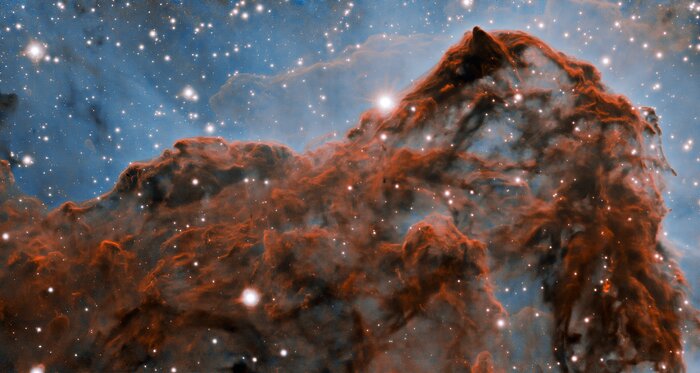Carina Nebula western wall (with adaptive optics)
A 50-trillion-km (33-trillion-mile, or 5 light-year) long section of the western wall in the Carina Nebula, as observed with adaptive optics on the Gemini South telescope. This mountainous section of the nebula reveals a number of unusual structures including a long series of parallel ridges that could be produced by a magnetic field, a remarkable almost perfectly smooth wave, and fragments that appear to be in the process of being sheared off the cloud by a strong wind. There is also evidence for a jet of material ejected from a newly-formed star. The exquisite detail seen in the image is in part due to a technology known as adaptive optics, which resulted in a ten-fold improvement in the resolution of the research team’s observations.
Credit:International Gemini Observatory/NOIRLab/NSF/AURA/P. Hartigan (Rice University)
Acknowledgment:
Image processing: Patrick Hartigan (Rice University), Travis Rector (University of Alaska Anchorage), Mahdi Zamani & Davide de Martin
About the Image
| Id: | noirlab2025a |
| Type: | Observation |
| Release date: | Oct. 5, 2020, 6 a.m. |
| Related releases: | noirlab2025 |
| Size: | 2954 x 1576 px |
About the Object
| Name: | Carina Nebula |
| Constellation: | Carina |
| Category: | Nebulae |
Wallpapers
Coordinates
| Position (RA): | 10 43 30.60 |
| Position (Dec): | -59° 35' 19.89" |
| Field of view: | 2.88 x 1.54 arcminutes |
| Orientation: | North is 90.0° right of vertical |
Colors & filters
| Band | Wave-length | Tele-scope |
|---|---|---|
| Infrared H I Brγ | 2.166 μm | Gemini South GSAOI |
| Infrared H2(1-0) S(1) | 2.248 μm | Gemini South GSAOI |

